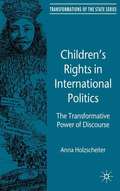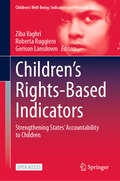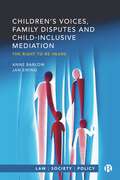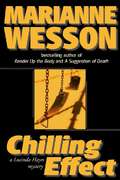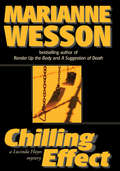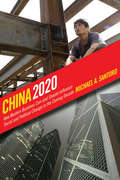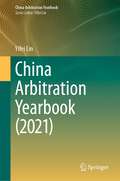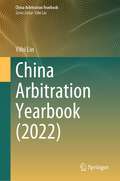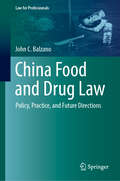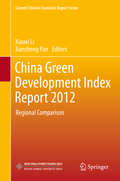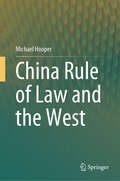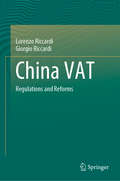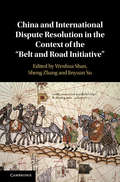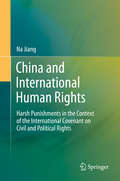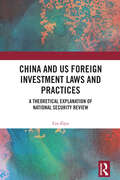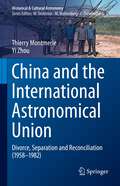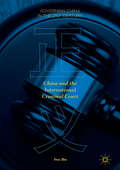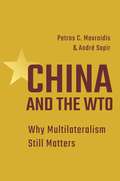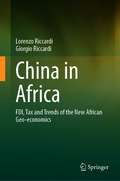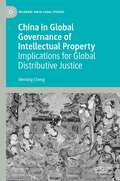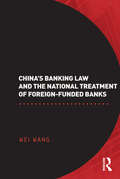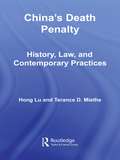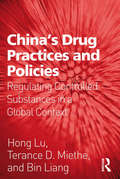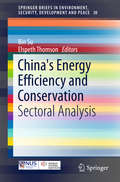- Table View
- List View
Children’s Rights in International Politics
by Anna HolzscheiterProvides insights into a lively field of international human rights politics - the protection of children and their rights - by looking at the negotiations leading to the 1989 UN Convention on the Rights of the Child.
Children’s Rights-Based Indicators: Strengthening States’ Accountability to Children (Children’s Well-Being: Indicators and Research #28)
by Ziba Vaghri Gerison Lansdown Roberta RuggieroThis open access volume provides the first-ever comprehensive framework of indicators to measure progress in the implementation of the UN Convention on the Rights of the Child. It analyses the development of thinking in the field of children’s rights on the significance of monitoring, and compiles a set of structural, process and outcome (SPO) aspects of children’s human rights-based indicators, for each article in the Convention. It draws on existing measures wherever possible, and involves wide-ranging consultation with experts in the field, along with 2000 children from 35 countries around the globe. This volume provides guidance on the implementation of children’s rights which will be of value to, among others, the UN Committee on the Rights of the Child, governments, policy-makers, advocates, and academics. The potential to measure the actions of governments in meeting the obligations they signed up to in the Convention provides an important contribution towards accountability to children. The indicators and associated analysis can serve as both guidance on what needs to happen to ensure the realisation of children’s rights and a benchmark against which to assess the impact of government action. This is an open access book.
Children’s Voices, Family Disputes and Child-Inclusive Mediation: The Right to Be Heard (Law, Society, Policy)
by Anne Barlow Jan EwingePDF and ePUB available open access under CC-BY-NC-ND licence. Recent legislative changes in England and Wales have eroded children’s ability to exercise their article 12 UNCRC rights to information, consultation and representation when parents separate. However, children’s voices may be heard through child-inclusive mediation (CIM). Considered from a children’s rights perspective, this book provides a critical socio-legal account of CIM practice. It draws on in-depth interviews with relationship professionals, mediators, parents and children, to consider the experiences, risks and benefits of CIM. It investigates obstacles to greater uptake of CIM and its role in improving children’s wellbeing and agency. Exploring the culture and practice changes necessary for a more routine application of CIM, the book demonstrates how reconceptualising CIM through a children’s rights framework could help to address barriers and improve outcomes for children.
Chilling Effect
by Marianne WessonEqual parts courtroom drama, intellectual journey, and character study, Chilling Effect is Marianne Wesson's most provocative Lucinda Hayes mystery to date. When attorney Lucinda Hayes reluctantly agrees to represent the mother of a brutally slain child, she must convince the court that the makers of a pornographic film are liable for the murder. As the case unfolds, Lucinda calls upon all her personal strength and legal talent, facing down her own ghosts as well as the powerful entertainment industry's star lawyers. In Chilling Effect, Wesson affirms the power of free speech to inspire the best and the worst human behavior and explores the tension between freedom and accountability.
Chilling Effect: A Lucinda Hayes Mystery
by Marianne WessonEqual parts courtroom drama, intellectual journey, and character study, Chilling Effect is Marianne Wesson's most provocative Lucinda Hayes mystery to date. When attorney Lucinda Hayes reluctantly agrees to represent the mother of a brutally slain child, she must convince the court that the makers of a pornographic film are liable for the murder. As the case unfolds, Lucinda calls upon all her personal strength and legal talent, facing down her own ghosts as well as the powerful entertainment industry's star lawyers. In Chilling Effect, Wesson affirms the power of free speech to inspire the best and the worst human behavior and explores the tension between freedom and accountability
China 2020: How Western Business Can—and Should—Influence Social and Political Change in the Coming Decade
by Michael A. SantoroChinese society is plagued by many problems that have a direct impact on its current and future business and political environment-worker rights, product safety, Internet freedom, and the rule of law. Drawing on knowledge gained through personal interviews, documentary sources, and almost two decades of visits to China, Michael A. Santoro offers a clear-eyed view of the various internal forces--such as regionalism, corruption, and growing inequality--that will determine the direction and pace of economic, social, and political change. Of special interest is Santoro's assessment of the role of multinational corporations in fostering or undermining social and political progress. Santoro offers a fresh and innovative way of thinking about two questions that have preoccupied Western observers for decades. What will be the effect of economic reform and prosperity on political reform? How can companies operate with moral integrity and ethics in China? In China 2020, Santoro unifies these hitherto separate questions and demonstrates that moral integrity (or lack of it) by Western business will have a profound impact on whether economic privatization and growth usher in greater democracy and respect for human rights. Offering a novel vision of China's future economic and political development, Santoro rejects the conventional view that China will muddle through the next decade with incremental social and political changes. Instead he argues that China will follow one or two widely divergent potential outcomes. It might continue to progress steadily toward greater prosperity, democracy, and respect for human rights, but it is also highly likely that China will instead fall backward economically and into an ever more authoritarian regime. The next decade will be one of the most important in the history of China, and, owing to China's global impact, the history of the modern world. China 2020 describes various tectonic social and political battles going on within China. The outcomes of these struggles will depend on a number of powerful indigenous forces as well as the decisions and actions of individual Chinese citizens. Santoro strongly believes that Western businesses can-and should-influence these developments.
China Arbitration Yearbook (China Arbitration Yearbook)
by Yifei LinThis book presents a selection of the latest arbitration cases, materials, and commentaries from China. It aims to provide information on the theory and practice of arbitration combined. It is intended to provide readers with a useful resource to guide them when they encounter actual China-related arbitration cases. This book is a valuable resource for all practitioners concerned with international and foreign-related arbitration matters in China, global law firms, companies engaged in multinational business, jurists, and academics.
China Arbitration Yearbook (China Arbitration Yearbook)
by Yifei LinThis book presents a selection of the latest arbitration cases, materials, and commentaries from China. It aims to provide information on the theory and practice of arbitration combined. It is intended to provide readers with a useful resource to guide them when they encounter actual China-related arbitration cases. This book is a valuable resource for all practitioners concerned with international and foreign-related arbitration matters in China, global law firms, companies engaged in multinational business, jurists, and academics.
China Food and Drug Law: Policy, Practice, and Future Directions (Law for Professionals)
by John C. BalzanoThis book is an analysis of policy and law governing the development, approval, manufacture, distribution, marketing and post-market surveillance of human drugs, medical devices, foods and cosmetics in Mainland China (“China FDD Regulation”). It analyzes the policy and general principles behind China FDD Regulation, including the history and jurisdiction of the central and local agencies that administer the laws and regulations, the administrative law structure in which these agencies operate, and other aspects of FDD Regulation interpretation and enforcement. Although it describes practice in China, this book is written in the comparative perspective (i.e., sensitive to assumptions made by those who are steeped in FDD Regulation in the U.S., Japan, and the EU). It includes one chapter on each regulatory space (drugs, medical devices, cosmetics, and food) organized by the lifecycle of products. It also covers subcategories of products, such as vaccines, radiopharmaceuticals, and in vitro diagnostic medical devices. The book includes specialty chapters on areas that are common to multiple types of regulated products, such as biosecurity and advertising. It is the first English language book of its kind, and it can serve as a resource for those in the FDD law and regulatory field to understand the mechanics of developing and marketing products, but also with insights for businesspeople and others, who are developing China-strategies.
China Green Development Index Report 2011: Regional Comparison (Current Chinese Economic Report Series)
by Xiaoxi Li Jiancheng PanWith the rapid growth of global industrialization, there has been substantial consumption of fossil fuels such as coal, petroleum, and natural gas along with growing carbon dioxide emissions. Unprecedented environmental and ecological crisis clouded the world. Fortunately, the Climate Conference in Copenhagen signaled hope amid the sluggish global economic recovery. Countries worldwide have been braced for developing their scientific and industrial strategies in the era of post financial crisis with a green and low-carbon philosophy. In 2008, the UN unveiled a plan for green politics and green economy, which is well-received and carried out by countries worldwide. China's 30-year rapid economic development has attracted worldwide attention. However, how to develop in a sustainable manner when faced with acute contradictions between economic growth, resources and environment has posed great challenges to China. Therefore, it is of great significance for us to speed up the study of green development and find a rational growth model. This study is completed by Prof. Li Xiaoxi and the dedication of other leading thinkers in economics, management, environment and resources together with the help of China Economic Monitoring and Analysis Center (CEMA).
China Rule of Law and the West
by Michael HooperThis book reveals how the Chinese Party-State uses "ideo-political education" to inculcate young citizens with official narratives on law. It provides an account of China's version of "rule of law" under the Yifa Zhiguo paradigm, arguing that authorities see law as a tool to apply when convenient and ignore when it impedes Party-State goals. Moving beyond the question of whether China's system can count as a rule of law order, this book identifies three consistent features of Chinese law reform since the Opening and Reform era began: the supremacy of the Communist Party of China over the law, instrumentalism, and reform-repression dualism. This book uniquely combines the "what" with the "how" of China's "rule of law" efforts. China law researchers will benefit from understanding how China's young adults learn about official law narratives. A more general audience interested in China's legal and political system will gain valuable insights from the analysis of China's "rule of law." The growing tensions between China and the West mean that now, more than ever, scholars and policymakers need to properly understand China. Understanding what Chinese officials mean when they talk about the rule of law in China helps avoid policy errors made from mistakenly assuming that Western definitions are universal. The contents of this book can also inform government and university efforts to properly accommodate Chinese students in the West while mitigating harmful manifestations of the nationalist ideology, in part implanted by ideo-political education.
China VAT: Regulations and Reforms
by Lorenzo Riccardi Giorgio RiccardiThis book clearly chronicles the evolution of Chinese VAT regulations, with a particular focus on the reforms of recent years. Covering all the provisions of the laws related to VAT, it also provides examples and implementation instructions. Practically structured and easy to consult, it allows readers to quickly find answers to questions that may arise in the course of their work. As such, the book is a valuable tool for accountants, advisors, lawyers, public officials and anyone working in the sector.
China and International Dispute Resolution in the Context of the 'Belt and Road Initiative'
by Wenhua Shan Sheng Zhang Jinyuan SuWritten by eminent international judges, scholars and practitioners, this book offers a timely study of China's role in international dispute resolution in the context of the construction of the 'Belt and Road Initiative' (BRI). It provides in-depth analysis of the law and practice in the fields of international trade, commerce, investment and international law of the sea, as they relate to the BRI construction. It is the first comprehensive assessment of China's policy and practice in international dispute resolution, in general and in individual fields, in the context of the BRI construction. This book will be an indispensable reading for scholars and practitioners with interest in China and international dispute resolution. It also constitutes an invaluable reference for anyone interested in the changing international law and order, in which China is playing an increasingly significant role, particularly through the BRI construction.
China and International Human Rights: Harsh Punishments in the Context of the International Covenant on Civil and Political Rights
by Na JiangThis book is designed to introduce law students, legal actors and human rights activists, particularly participants in human rights dialogues with China, to the process and reality of a newly confident China's participation in the international human rights system, albeit with inherent challenges. From an international and comparative perspective, one of the key findings of the author's research is that progress towards human rights depends more on judges than on legislators. Chinese legislators have enacted a series of reforms in order to better protect human rights. Unfortunately, these reforms have not led to greater adherence to China's international human rights obligations in practice. The reforms failed because they have generally been misunderstood by Chinese judges, who often have a limited understanding of international human rights norms. Specifically, this book will examine how judicial misunderstandings have blocked reforms in one specific area, the use of severe punishments, based on international human rights theory and case studies and data analyses. This examination has several purposes. The first is to suggest that China ratify the ICCPR as the next step for its substantive progress in human rights and as a good preparation for its re-applying to be a member of the UN Human Right Council in the future. The second is to explain how judges could be better educated in international human rights norms so as to greatly reduce the use of severe punishments and better comply with China's human rights obligations. The third is to demonstrate how the international community could better engage with China in a manner that is more conducive to human rights improvements. The author's ultimate goal is to enhance dialogue on human rights in China between judges and the Chinese government, between Chinese judges and their foreign counterparts and between China's government and the international community. Another significant aim of this book is to clarify the controversial question of what obligations China should undertake before its ratification of the ICCPR and to re-examine trends in its developing human rights policy after standing down from the Council in late 2012. The tortuous progress of China's criminal law and criminal justice reforms has confirmed that Chinese judges need further instruction on how to apply severe punishments in a manner consistent with international standards. Judges should be encouraged to exercise more discretion when sentencing so that penalties reflect the intent of relevant domestic laws as well as the international human rights standards enumerated in the ICCPR. In order to better educate and train judges, this book contains introductory chapters that examine the severe punishments currently available to Chinese judges from an international human rights perspective. To illustrate how Chinese justice currently falls short of international norms, this paper also examines several cases that are considered to be indicative of China's progress towards greater respect for human rights and the rule of law. These cases demonstrate that China still has a long way to go to achieve its goals, at least before abolishing the death penalty, forced labor and torture.
China and US Foreign Investment Laws and Practices: A Theoretical Explanation of National Security Review
by Liu ZiyuThe book is a comparative study of the national security review of foreign investment laws in China and the US.The author establishes a theoretical framework to explain the dominant role of ideas on national security and foreign investment rooted in China and the US, as well as the oriented role of China-US investment interaction. She concludes that it is difficult for China and the US to reach a consensus on national security review due to their different internal ideas on national security and foreign investment. By comparing the similarities and differences in the development of national security review in China and the US, she also proposes a feasible approach to facilitate bilateral investment practices.The book will attract scholars of international economic law, investment law, and Sino-US relations.
China and the International Astronomical Union: Divorce, Separation and Reconciliation (1958–1982) (Historical & Cultural Astronomy)
by Thierry Montmerle Yi ZhouSeen from “inside the IAU,” this book tells the in-depth story of a major crisis in which China “divorced” from the International Astronomical Union in 1960 as a protest against the admission of Taiwan. This happened to all the scientific unions at the same time, and to the Olympic Games, which, unexpectedly, would serve as a laboratory for the “reconciliation” which took place following the re-opening of China to the world 20 years later.The so-called “China conflict” is the most important crisis in the post-WWII history of the IAU. Yet, many details about this conflict and its links to broader geopolitical events have long remained unsettled, obscure, or altogether absent. In particular, the book describes for the first time the “separation” period, which covered the Cultural Revolution, and in which the IAU made desperate official efforts to reach out to China, while some groups of Western and Chinese astronomers managed to keep contact at times. On the occasion of the IAU Centenary celebrations in 2019, the book revisits this painful succession of events using unpublished documents from the IAU Archives and the International Council of Scientific Unions. The book also contains supplementary typescripts of selected handwritten correspondences and the full translation of key original Chinese documents unknown to readers outside China.What emerges is a complex and fascinating story of human relations and science diplomacy under the shadow of the Cold War. Readers will learn how the 20-year “China conflict” as lived by astronomers and scientists is important not only for the history of the IAU, but also for the history of contemporary China. “This book is full of so many original documents of the IAU office, very reliable and good to open to the public readers.” Shuhua Ye, Shanghai Observatory (IAU Vice-President, 1988-1994)This book is a companion book to "Astronomers as Diplomats," published at the same time in the same series.
China and the International Criminal Court (Governing China in the 21st Century)
by Dan ZhuThis book focuses on the evolving relationship between China and the International Criminal Court (ICC). It examines the substantive issues that have restricted China’s engagement with the ICC to date, and provides a comprehensive assessment of whether these Chinese concerns still constitute a significant impediment to China’s accession to the ICC in the years to come. The book places the China-ICC relationship within the wider context of China’s interactions with international judicial bodies, and uses the ICC as an example to reflect China’s engagement with international institutions and global governance in general. It seeks to offer a thought-provoking resource to international law and international relations scholars, legal practitioners, government legal advisers, and policy-makers about the nature, scope, and consequences of the relationship between China and the ICC, as well as its impact on both global governance and order. This book is the first of its kind to explore China’s engagement with the ICC primarily from a legal perspective.
China and the WTO: Why Multilateralism Still Matters
by Petros C. Mavroidis Professor Andre SapirAn examination of China’s participation in the World Trade Organization, the conflicts it has caused, and how WTO reforms could ease them China’s accession to the World Trade Organization (WTO) in 2001 was rightly hailed as a huge step forward in international cooperation. However, China’s participation in the WTO has been anything but smooth, with China alienating some of its trading partners, particularly the United States. The mismatch between the WTO framework and China’s economic model has undermined the WTO’s ability to mitigate tensions arising from China’s size and rapid growth. What has to change? China and the WTO demonstrates that unilateral pressure, by the United States and others, is not the answer. Instead, Petros Mavroidis and André Sapir show that if the WTO enacts judicious reforms, it could induce China’s cooperation, leading to a renewed confidence in the WTO system.The WTO and its predecessor, the General Agreement on Tariffs and Trade, are predicated on liberal domestic policies. They managed the previous accessions of socialist countries and big trading nations, but none were as large or powerful as China. Mavroidis and Sapir contend that for the WTO to function smoothly and accommodate China’s unique geopolitical position, it needs to translate some of its implicit principles into explicit treaty language. To make their point, they focus on two core complaints—that Chinese state-owned enterprises (SOEs) benefit from unfair trade advantages, and that domestic companies, private as well as SOEs, impose forced technology transfer on foreign companies as a condition for accessing the Chinese market—and they lay out specific proposals for WTO reforms.In an age of global trade disputes, China and the WTO offers a timely exploration of unprecedented challenges to the current multilateral system and fresh ideas for lasting solutions.
China in Africa: FDI, Tax and Trends of the New African Geo-economics
by Lorenzo Riccardi Giorgio RiccardiThis book highlights China’s engagement with Africa through trade, investment and financial linkages. Its three main goals are as follows: firstly, to provide insights into Chinese FDI in Africa, by exploring a range of infrastructural projects and several countries’ historical, geographical, socio-political, cultural and economic backgrounds; secondly, to present the main double taxation treaties with Beijing and country profiles of the African economies; and lastly, to provide a valuable business guide for recognizing and capitalizing on new opportunities in Afro-Eurasia.
China in Global Governance of Intellectual Property: Implications for Global Distributive Justice (Palgrave Socio-Legal Studies)
by Wenting ChengThis book analyses how China has engaged in global IP governance and the implications of its engagement for global distributive justice. It investigates five cases on China’s IP engagement in geographical indications, the disclosure obligation, IP and standardisation, and its bilateral and multilateral IP engagement. It takes a regulation-oriented approach to examine substate and non-state actors involved in China’s global IP engagement, identifies principles that have guided or constrained its engagement, and discusses strategies actors have used in managing the principles. Its focus on engagement directs attention to processes instead of outcomes, which enables a more nuanced understanding of the role that China plays in global IP governance than the dichotomic categorisation of China either as a global IP rule-taker or rule-maker. This book identifies two groups of strategies that China has used in its global IP engagement: forum and agenda-related strategies and principle-related strategies. The first group concerns questions of where and how China has advanced its IP agenda, including multi-forum engagement, dissembling, and more cohesive responsive engagement. The second group consists of strategies to achieve a certain principle or manage contesting principles, including modelling and balancing. It shows that China’s deployment of engagement strategies makes its IP system similar to those of the EU and the US. Its balancing strategy has led to constructed inconsistency of its IP positions across forums. This book argues that China still has some way to go to influence global IP agenda-setting in a way matching its status as the second largest economy.
China in the International Economic Order
by Colin B. Picker Toohey, Lisa and Picker, Colin B. and Greenacre, Jonathan Lisa Toohey Jonathan GreenacreThe enormous economic power of the People's Republic of China makes it one of the most important actors in the international system. Since China's accession to the World Trade Organization in 2001, all fields of international economic law have been impacted by greater Chinese participation. Now, just over one decade later, the question remains as to whether China's unique characteristics make its engagement fundamentally different from that of other players. In this volume, well-known scholars from outside China consider the country's approach to international economic law. In addition to the usual foci of trade and investment, the authors also consider monetary law, finance, competition law, and intellectual property. What emerges is a rare portrait of China's strategy across the full spectrum of international economic activity.
China's Banking Law and the National Treatment of Foreign-Funded Banks
by Wei WangThis book assesses new developments in and reform of China's banking law system following its accession of the WTO. It focuses on the relationship between GATS/WTO national treatment obligations and China's banking law. Tracing the history of national treatment in China, the book compares the treatment of foreign-funded banks with the treatment of Chinese-funded banks and examines the structure and shortcomings of the existing banking law framework in China. Offering suggestions as to how the framework could be restructured and analysing the economic and political bases of an integrated banking law framework, the book argues that reorganization would bring about greater consistency with GATS/WTO national treatment requirements. The book also explores the ambiguous definition of prudential carve-out, the subtle relationship between GATS national treatment and market access based on WTO cases, national treatment clauses in China’s bilateral investment treaties, and special treatment on banking in China’s free trade agreements. This volume is a valuable resource for academics and students as well as professionals and policy-makers working in the field of banking, WTO, Chinese law and foreign trade.
China's Death Penalty: History, Law and Contemporary Practices (Routledge Advances in Criminology #5)
by Terance D. Miethe Hong LuBy all accounts, China is the world leader in the number of legal executions. Its long historical use of capital punishment and its major political and economic changes over time are social facts that make China an ideal context for a case study of the death penalty in law and practice. This book examines the death penalty within the changing socio-political context of China. The authors'treatment of China' death penalty is legal, historical, and comparative. In particular, they examine; the substantive and procedures laws surrounding capital punishment in different historical periods the purposes and functions of capital punishment in China in various dynasties changes in the method of imposition and relative prevalence of capital punishment over time the socio-demographic profile of the executed and their crimes over the last two decades and comparative practices in other countries. Their analyses of the death penalty in contemporary China focus on both its theory - how it should be done in law - and actual practice - based on available secondary reports/sources.
China's Drug Practices and Policies: Regulating Controlled Substances in a Global Context
by Terance D. Miethe Hong Lu Bin LiangIn the context of global efforts to control the production, distribution and use of narcotic drugs, China's treatment of the problem provides an important means of understanding the social, political, and economic limits of national and international policies to regulate drug practices. In the nineteenth and early twentieth centuries, China was known for its national addiction to opium, but its drug-eradication campaigns from the 1950s to the 1970s achieved unprecedented success that ultimately transformed China into a "drug-free" society. However, since the economic reforms and open-door policy of the late twentieth century, China is now facing a re-emergence of the production, use and trafficking of narcotic drugs. Employing case studies and a comparative historical approach, and drawing on a variety of data sources including historical records, official crime data only recently made available, and news reports, this book is the first English-language publication to provide such a comprehensive documentation and analysis of the nature of China's legal regulation of controlled substances. The authors also offer theoretical approaches for studying drug regulation, aspects of drug consumption cultures, the socio-political treatment of drugs during various historical periods and ongoing efforts to legislate drug trade, criminalize drug use and manage the drug addict population within national and international contexts.
China's Energy Efficiency and Conservation: Sectoral Analysis (SpringerBriefs in Environment, Security, Development and Peace #30)
by Bin Su Elspeth ThomsonThis Brief identifies various aspects of energy challenges faced by the Chinese central/local governments, and also provides an opportunity to study how best to achieve green growth and a low-carbon transition in a developing country like China. The progress of China's carbon mitigation policies also has significant impacts on the on-going international climate change negotiations. Therefore, both policymakers and decision makers in China and other countries can benefit from studying the challenges and opportunities in China's energy development.
